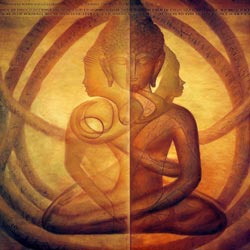 Buddhism can be seen as a "fork" from Hinduism in the sense that it emerged from the same cultural and religious context in ancient India, with Siddhartha Gautama, the historical Buddha, being born into a Hindu family. However, it is essential to recognize that Buddhism and Hinduism are distinct traditions with their own unique philosophies, practices, and goals. While they share some common elements and have influenced each other over the centuries, they have also diverged in several significant ways.
Buddhism can be seen as a "fork" from Hinduism in the sense that it emerged from the same cultural and religious context in ancient India, with Siddhartha Gautama, the historical Buddha, being born into a Hindu family. However, it is essential to recognize that Buddhism and Hinduism are distinct traditions with their own unique philosophies, practices, and goals. While they share some common elements and have influenced each other over the centuries, they have also diverged in several significant ways.
One key difference between Buddhism and Hinduism lies in their respective views on the nature of the self or the soul. Hinduism generally upholds the concept of the atman, an eternal soul or self that undergoes a cycle of birth, death, and rebirth (samsara) until it reaches moksha, or liberation from this cycle. In contrast, Buddhism teaches the concept of anatta, or no-self, asserting that there is no permanent, unchanging essence within an individual. Instead, Buddhism proposes that our perceived sense of self is a result of interdependent, ever-changing factors known as the Five Aggregates (form, feeling, perception, mental formations, and consciousness). By understanding the impermanent and interconnected nature of these aggregates, one can break free from the cycle of samsara and achieve enlightenment, or Nirvana.
Another significant difference between Hinduism and Buddhism involves their respective approaches to the caste system. While Hinduism is historically intertwined with the caste system, prescribing social roles and responsibilities based on one's birth, Buddhism rejects this rigid structure. The Buddha welcomed individuals from all social classes into the monastic order, emphasizing personal conduct and understanding, rather than birth, as the key determinants of spiritual progress.
Despite these differences, Buddhism and Hinduism share some similarities, such as the belief in karma (the law of cause and effect, shaping an individual's future based on their past actions), dharma (the cosmic law, moral code, or teachings that guide one's life), and the cycle of samsara (the cycle of birth, death, and rebirth). Both traditions also emphasize the importance of meditation, mindfulness, and ethical conduct as vital components of spiritual practice. Furthermore, they both recognize the value of the guru-student relationship, as well as the necessity of compassion, loving-kindness, and other virtues in the pursuit of spiritual growth.
Over time, Buddhism and Hinduism have also influenced one another, with various Buddhist ideas and practices being absorbed into Hinduism and vice versa. For instance, certain Hindu traditions have incorporated the Buddha as an avatar of the god Vishnu, while some Buddhist schools have adopted elements of Hindu cosmology and iconography.
In conclusion, while Buddhism can be seen as a "fork" from Hinduism in terms of its historical and cultural origins, it is crucial to acknowledge the distinct philosophical and practical differences between the two traditions. Their unique approaches to the nature of the self, the path to spiritual liberation, and social structures, among other aspects, demonstrate that Buddhism and Hinduism are separate and independent traditions. Nevertheless, their shared history and cultural exchange have resulted in certain similarities and mutual influences, which continue to shape the development and understanding of both traditions to this day. As a result, the relationship between Buddhism and Hinduism can be seen as one of both divergence and convergence, highlighting the complex and multifaceted nature of spiritual and philosophical traditions.






